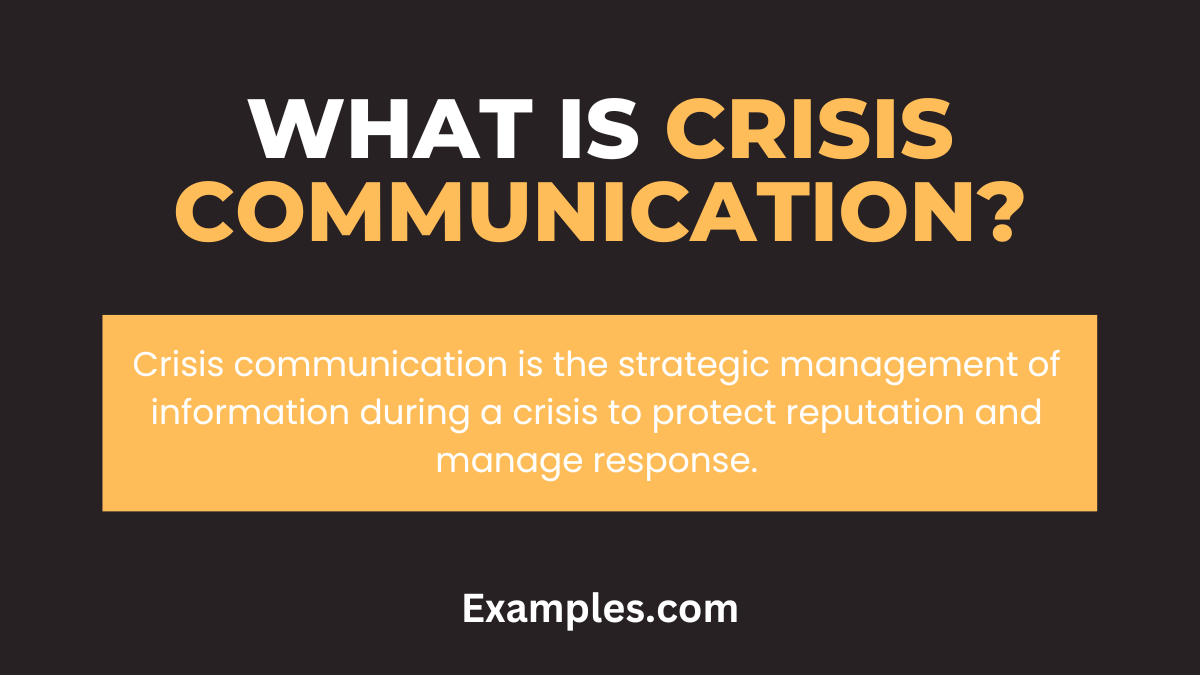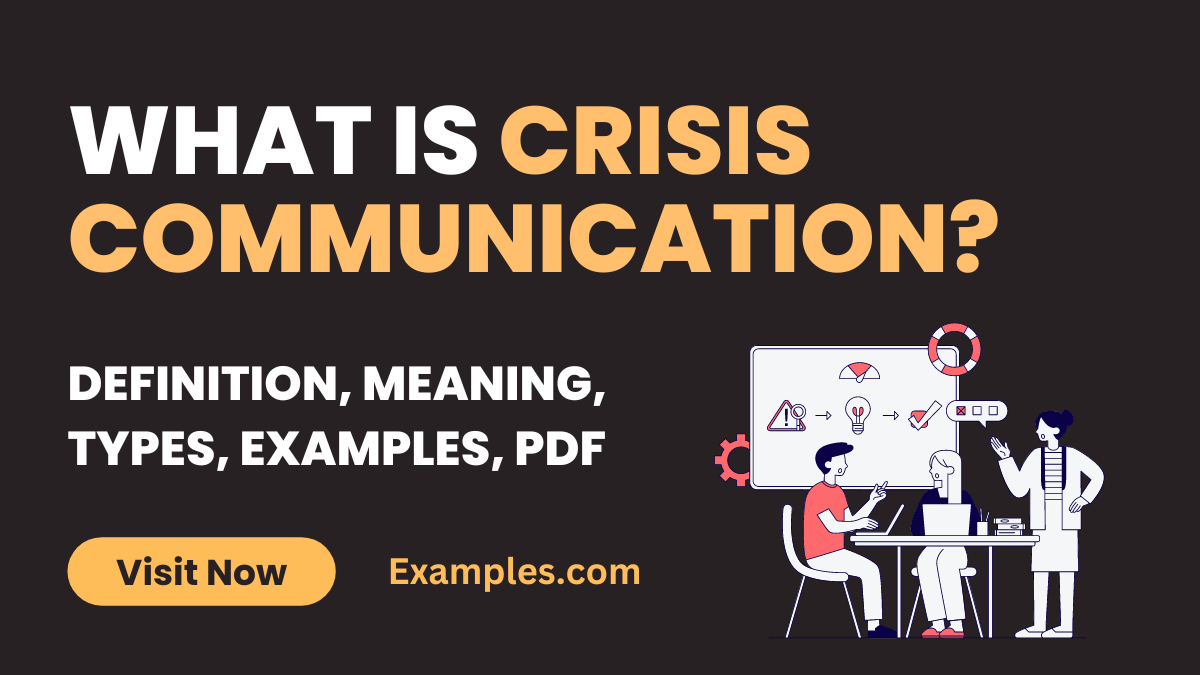What is Crisis Communication?
In the face of adversity, effective Crisis Communication is crucial. This comprehensive guide offers an in-depth look at the definition and significance of ‘Crisis Communication’. We explore various strategies and provide practical examples on how to use these techniques in real-life scenarios. Whether you’re a business leader, a public relations professional, or simply someone looking to understand how to communicate effectively during crises, this guide equips you with the necessary tools and insights to navigate through challenging communications landscapes.
What is Crisis Communication? – Definition

Crisis Communication is the practice of managing information during a critical situation or emergency to handle the immediate and potential impact it could have. It involves how organizations or individuals communicate with the public, stakeholders, or employees during a crisis. The goal is to provide accurate, timely, and transparent information to minimize negative effects, manage public perception, and prevent misinformation. Effective crisis communication can help maintain trust and calm in challenging times, ensuring that all parties are informed about what’s happening and what’s being done in response.
Examples of Crisis Communication
Crisis Communication Examples illustrate how organizations handle unexpected, often adverse situations that could potentially harm their reputation, stakeholders, or bottom line. Here are some examples:
- Product Recalls: A company issuing a product recall due to safety concerns, promptly informing customers, offering refunds or replacements, and explaining steps taken to prevent future issues.
- Natural Disasters: A business responding to a natural disaster (like a hurricane or earthquake) affecting its operations, by communicating safety measures for employees, impact on services, and relief efforts.
- Data Breach: A tech company experiencing a data breach, quickly informing affected users, detailing the extent of the breach, the data compromised, and measures taken to secure the system and prevent future incidents.
- PR Scandals: A corporation addressing a public relations scandal, such as an executive’s misconduct, by openly acknowledging the issue, stating the actions taken against the involved individuals, and the steps implemented to ensure such incidents don’t recur.
- Health Crises: A hospital dealing with a health crisis, like an outbreak of an infectious disease, communicating transparently about the situation, measures taken to address it, and guidelines for public safety.
- Social Media Missteps: A brand responding to a social media crisis caused by an offensive ad or statement, by issuing a public apology, explaining how it happened, and the actions taken to rectify and prevent similar issues.
- Environmental Incidents: A company involved in an environmental incident, such as an oil spill, quickly taking responsibility, outlining the environmental impact, cleanup efforts, and steps to prevent future incidents.
- Financial Instability: A financial institution facing a financial crisis, communicating to its customers and stakeholders about its stability, steps taken to safeguard their assets, and future financial plans.
Crisis Communication Strategies
Effective crisis communication strategies involve quick response, transparency, consistent messaging, and empathy. These strategies aim to manage the situation, provide accurate information, maintain public trust, and minimize damage by addressing stakeholders’ concerns and needs during a crisis.
- Rapid Response in Crisis Communication
- Transparent Communication in Crisis Communication
- Consistent Messaging in Crisis Communication
- Stakeholder Engagement in Crisis Communication
- Media Management in Crisis Communication
- Social Media Monitoring in Crisis Communication
- Empathy and Apology in Crisis Communication
- Factual Accuracy in Crisis Communication
- Preparedness Planning in Crisis Communication
- Post-Crisis Evaluation in Crisis Communication
Types of Crisis Communication
Crisis communication types include internal communication within an organization, external communication to the public and media, and interactive communication through social media platforms. Each type plays a crucial role in managing different aspects and stakeholders of a crisis.
- Proactive Communication in Crisis Management
- Reactive Communication in Crisis Management
- Instructional Communication in Crisis Management
- Adjustment Communication in Crisis Management
- Reputation Management Communication in Crisis Management
- Internal Crisis Communication
- External Crisis Communication in Crisis Management
- Social Media Communication in Crisis Management
- Stakeholder-Specific Communication in Crisis Management
- Post-Crisis Communication
Elements of Crisis Communication
Key elements of crisis communication include a prepared response plan, clear and concise messaging, rapid information dissemination, and continuous monitoring and adjustment of the communication strategy based on the evolving nature of the crisis and public feedback.
Crisis Communication in Public Relations
In public relations, crisis communication focuses on protecting and defending an organization’s reputation during a crisis. It involves strategic planning, media relations, and message control to mitigate negative impacts and maintain a positive public image.
Crisis Communication in Business
Crisis communication in business involves managing communication during unexpected events that can negatively affect the company. It’s about ensuring stakeholders are informed, reassured, and aware of the company’s actions to resolve the crisis and safeguard its reputation.
Crisis Communication in the Digital Age
In the digital age, crisis communication incorporates social media and online platforms for rapid information dissemination and interaction with the public. It requires real-time monitoring, quick responses, and adapting to the digital landscape’s fast-paced nature.
Crisis Communication Careers
Careers in crisis communication include roles such as crisis managers, public relations specialists, and communication consultants. Professionals in this field are skilled in strategic planning, media relations, and effective communication during high-pressure situations.
Top Crisis Communication Firms
Top crisis communication firms specialize in helping organizations prepare for, respond to, and recover from crises. They offer expertise in media relations, reputation management, and strategic communication to navigate complex crisis situations effectively.
Tips for Crisis Communication
Tips for effective crisis communication include being proactive, maintaining honesty and transparency, showing empathy and concern, communicating regularly, and having a solid crisis response plan. These tips help in effectively managing a crisis and maintaining trust with stakeholders.
Crisis Communication is an essential skill in effectively navigating unexpected challenges. This guide highlights key strategies, types, and elements crucial for managing crises in various domains. By understanding these concepts and applying the provided tips, individuals and organizations can communicate effectively during crises, maintaining trust and minimizing impact while navigating through turbulent situations with clarity and confidence.



